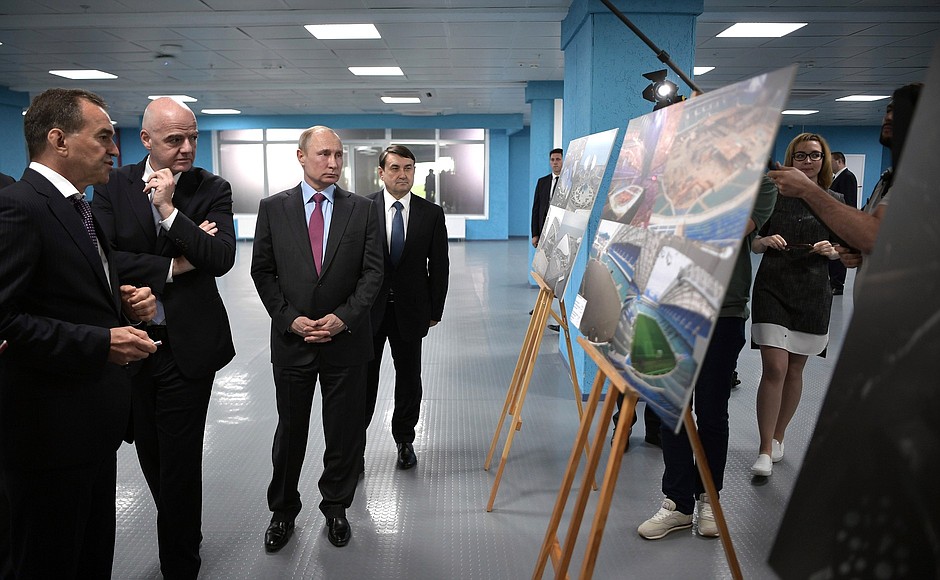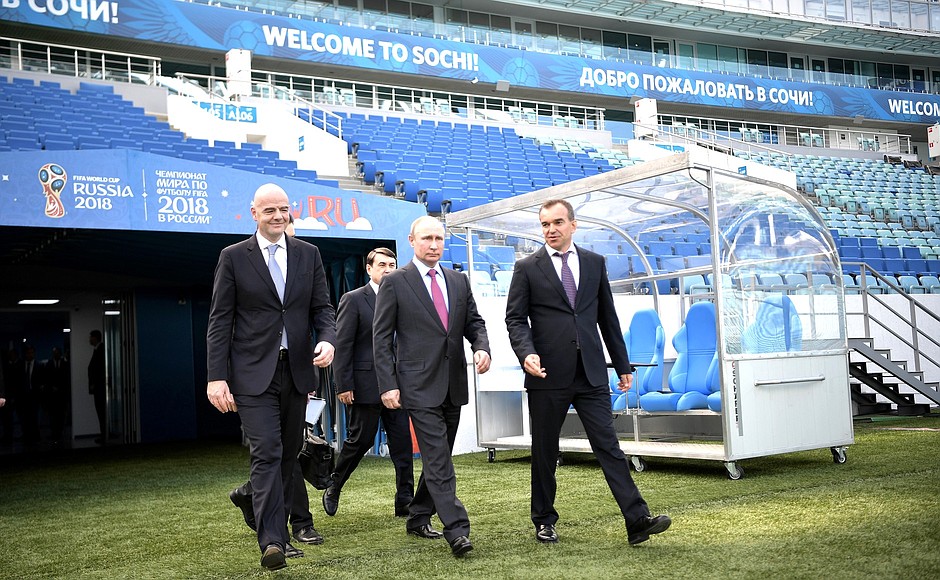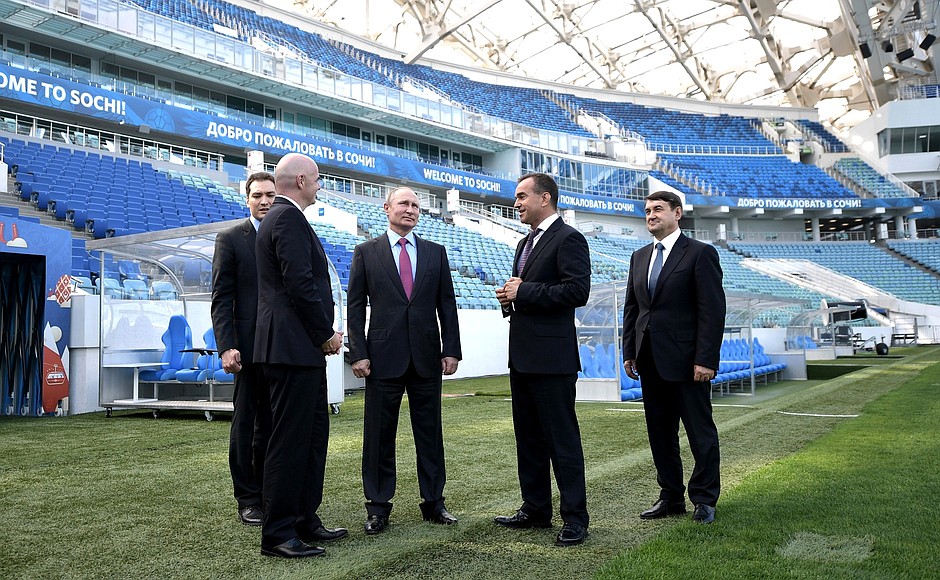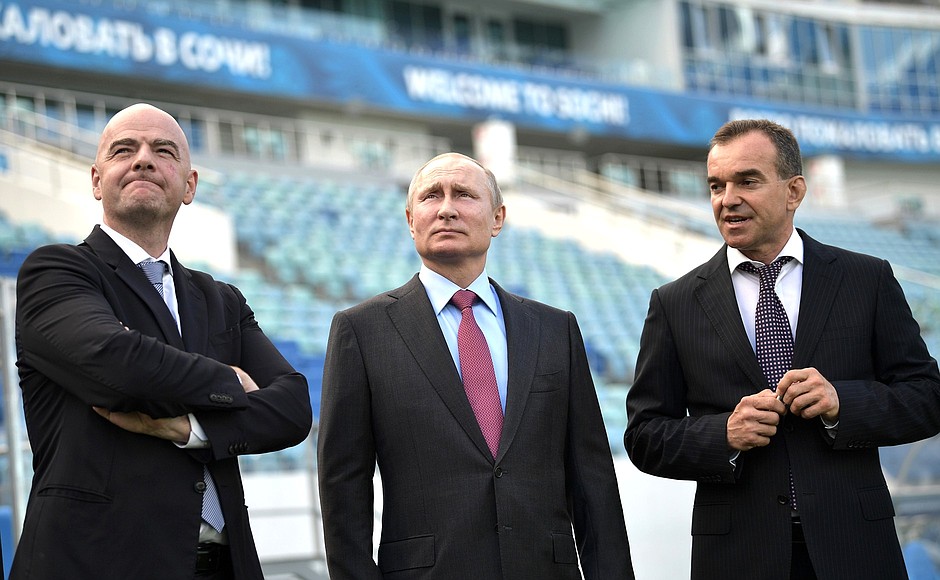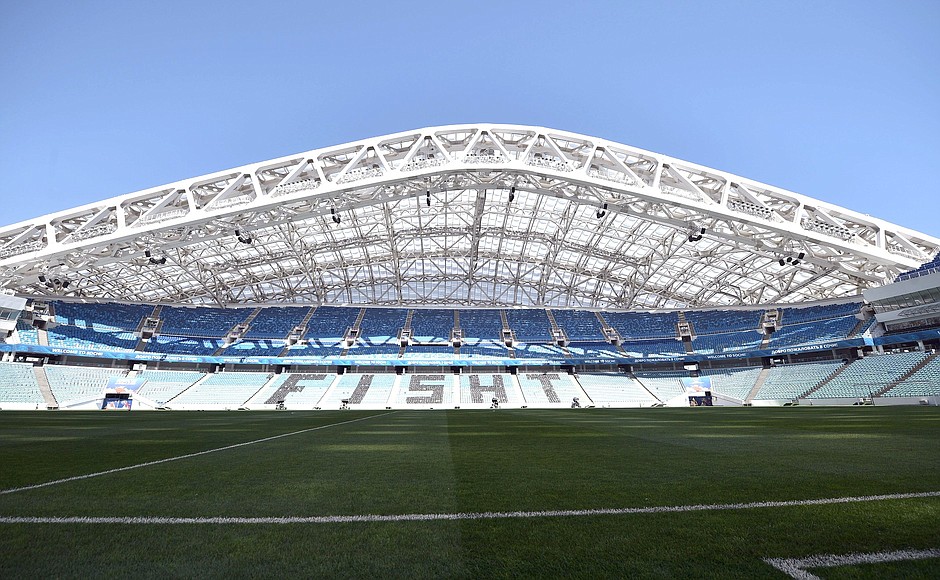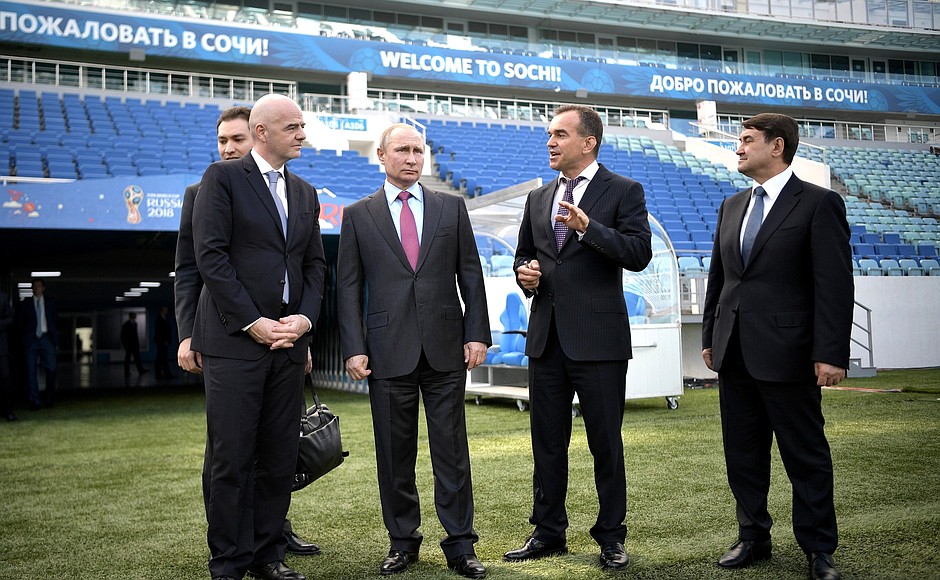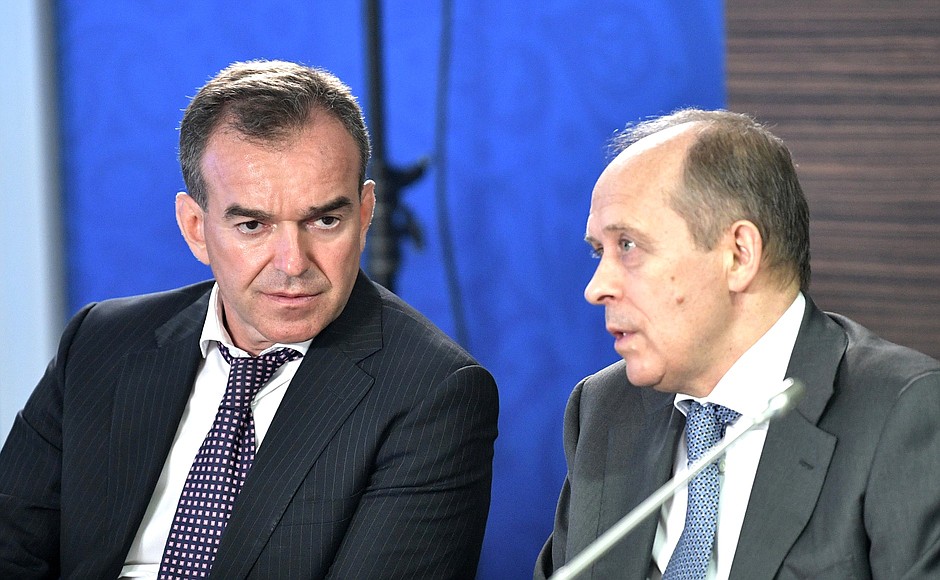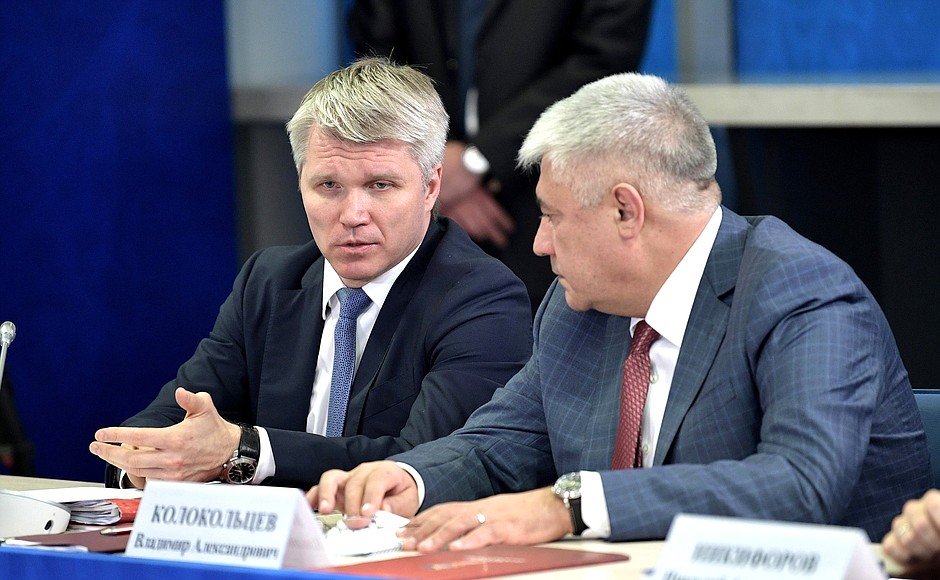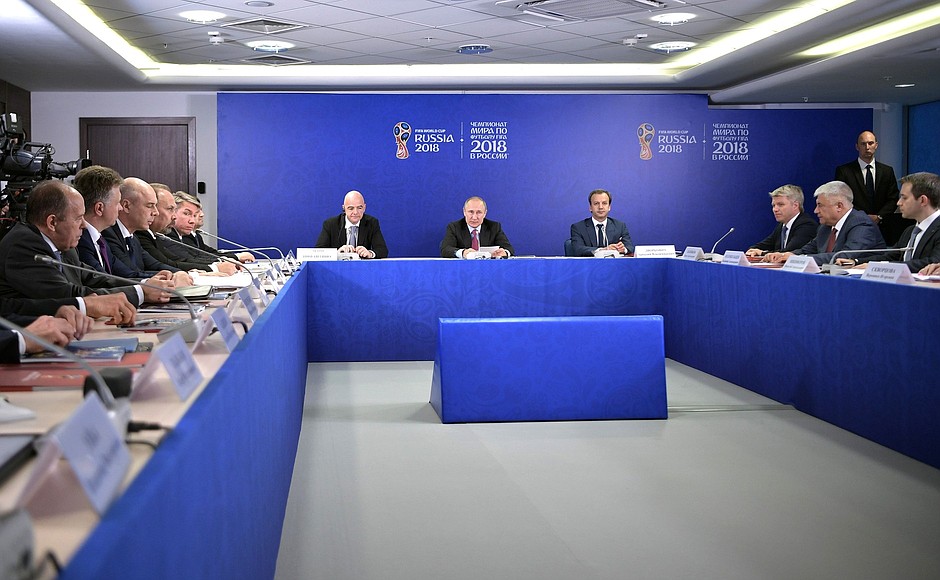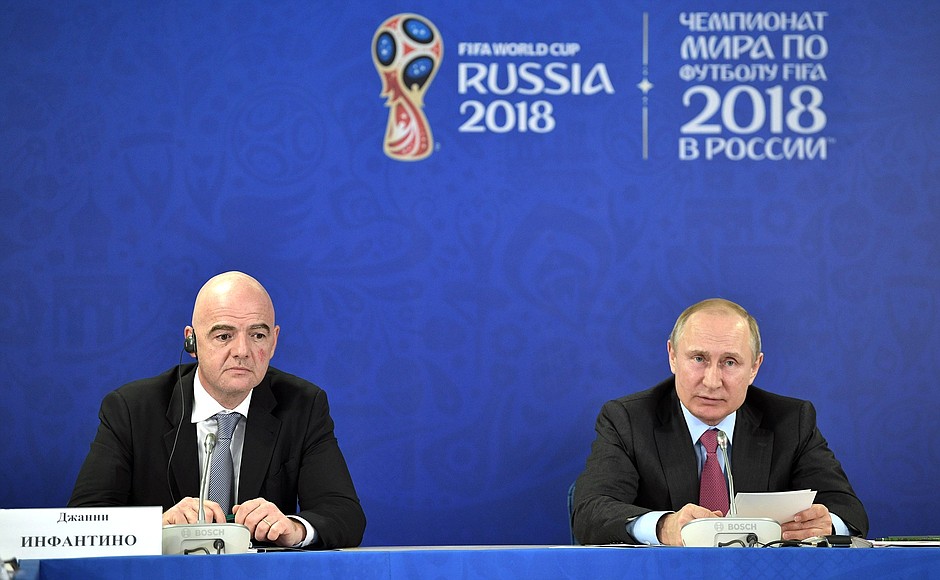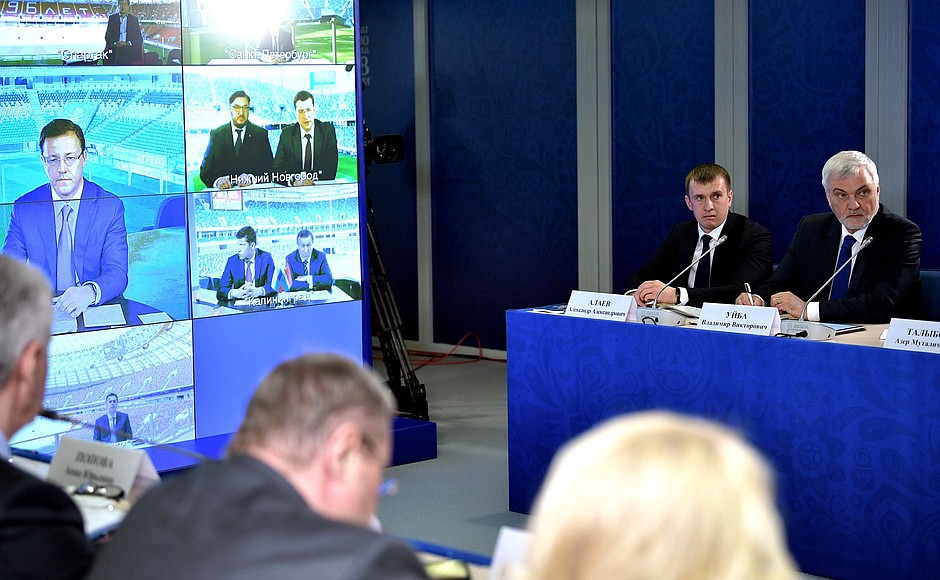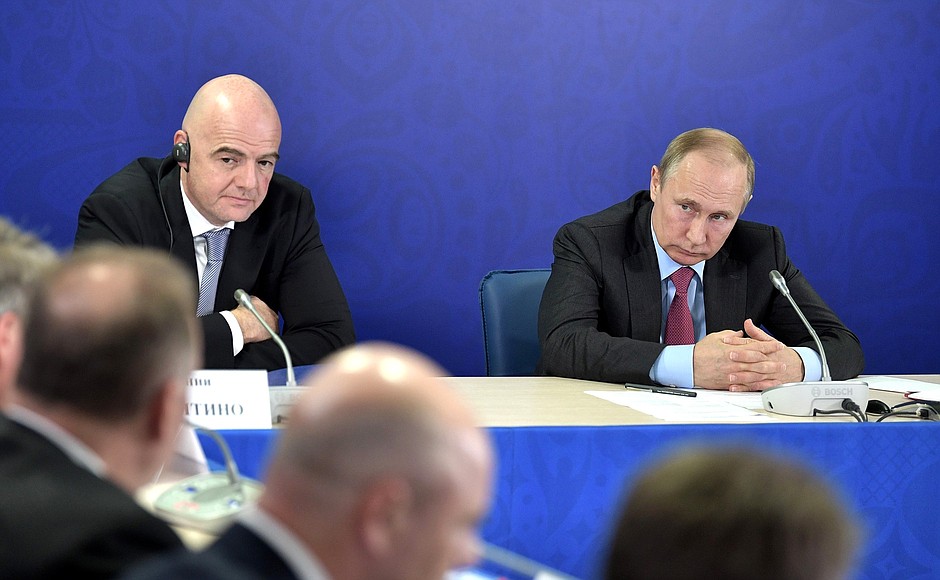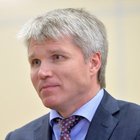A meeting of the Russia 2018 Local Organising Committee Supervisory Board is underway at Fisht Stadium. The arena with 40,000 seats opened in December 2013. It was used for the opening and closing ceremonies of the 2014 Winter Olympic and Paralympic Games. Last year, it hosted Confederations Cup matches.
During the second reconstruction of the stadium, the roof and temporary structures were dismantled, northern and southern stalls were erected, entrance pavilions were built, a game pitch laid, the spaces under the stalls were renovated and 4,301 temporary seats were added. The arena can seat 45,000 in total after the reconstruction, of which 42,000 seats are included in the 2018 FIFA World Cup ticket programme.
Vladimir Putin and Gianni Infantino inspected the stadium before of the meeting.
* * *
Excerpts from transcript of meeting of the 2018 FIFA World Cup Russia Local Organising Committee Supervisory Board
President of Russia Vladimir Putin: Good afternoon, colleagues, Mr Infantino,
Preparations for the World Cup, which Russia will host this year, are almost completed. Russia is ready for the tournament. A great deal has been done. We are beginning the most important phase: the meticulous adjustment of all the mechanisms involved in the championship.
I would like to turn to my colleagues, heads of the Russian regions where matches will be held and where fans and tourists will come.
Colleagues, the burden on the regions, on you and on all regional agencies will grow several fold. The situation will require your constant attention and personal involvement in organising this work.
Local residents’ comfort, efficient logistics for guests and players, road traffic and cultural events are the matters for regions to take care of. For a whole month our regions will be in the spotlight of the entire world, including dozens of international media.
I want to particularly note the importance of timely and solid improvements in the host cities. I am not only talking about the stadiums but also about accommodation, training areas and the facilities to be visited by spectators.
Let me add that the tournament is not the only reason for these improvements. Workathons, spit and polish are not the point. Order and improvements is a daily job of regional and municipal authorities – primarily, in the interests of local residents.
As hospitable and attentive hosts of the tournament, it is our duty to take care of every football fan attending the matches. Volunteers and staff working at the venues must be ready to provide necessary assistance to the guests with a great variety of issues, be it accommodation, catering or cultural programme.
Medical assistance is an essential matter. Bureaucratic obstacles and red tape must be eliminated. Lack of insurance or registration in a city is only a technical issue. Prompt and quality medical help is most important.
We must once again thoroughly analyse disease control aspects that could be affected by large crowds and see which additional decisions may be required. This must also be considered well in advance. It is the responsibility of the Federal Service for the Oversight of Consumer Protection and Welfare, which is to ensure that all the relevant services are coordinated.
Transfer of tournament guests between host cities must be as comfortable as possible. I ask the Transport Ministry and the Organising Committee to review the preparations once more. I want to note that for the first time in the World Cup’s history, Russia has guaranteed the right of free transit to football fans. More than 700 additional trains have been put in operation for this purpose.
There must also be comfortable and sufficient air communication. I would like to note that the preparations for the tournament in the field of transport have involved the most ambitious measures.
It is important that the infrastructure created, including modern airports, railway stations, roads, junctions, developments in the field of digital technologies and intelligent control systems, will be harmoniously integrated into the national transport system and will serve the dynamic development of our regions and cities, of business activity in the country as a whole and, of course, improving the quality of life.
Special attention will certainly need to be given to security issues. At the same time, law enforcement agencies must carry out all the necessary procedures courteously and discreetly, remembering that the tournament is a big celebration for many thousands of fans.
We are always glad to welcome our guests and are open to communication. We know that the atmosphere of the tournament that unites people, the positive attitude of spectators and participants and the image of Russia as a hospitable country are also a significant part of the World Cup legacy.
The success of such a large-scale event always motivates people to take up sports, encourages a proactive attitude to the country’s public life and the desire to be useful.
A vivid example is the Olympic and Paralympic Games in Sochi, where we are now, at the end of which thousands of children and adults chose sports and an active way of life. The volunteer movement also received a powerful impulse. I have no doubt that the World Cup will have the same meaningful effect, as football is one of the most loved and popular sports in Russia.
Today I would ask you to report both on the readiness of all the facilities and on the progress of work on the tournament legacy programme, including the creation of children’s football centres. We talked about this from the very beginning, when we submitted our bid.
Colleagues, this summer, the best of their best, the most talented football players in the world will come to Russia. But of course, special attention of Russian fans will be focused on the performance of the national team. We all hope that our players will do their best and, most importantly, show the kind of dedicated, uncompromising football that fans appreciate and enjoy.
I think we should wish success to our players and coaches.
Let us move on to our work, to discussing the issues for which we gathered today.
I would like to give the floor to Minister of Sport Pavel Kolobkov.
Minister of Sport Pavel Kolobkov: Mr President, colleagues,
Our preparations for the World Cup have entered the final stage. Russia’s commitments, including the government guarantees issued to FIFA, are being complied with as part of the special Federal Law on the Championship and the programme of preparations for the World Cup. The activities under the Transport Strategy and the Concept of Communications and Information Technology are also underway.
The programme of preparations for the championship has been ongoing since 2013. The programme provides for 261 events and 254 capital construction sites. Notably, the programme is of a comprehensive nature and provides for 16 other activities, including the development of regulatory and legal acts, the concept for developing communications, a comprehensive programme of security measures, the operational activities of the Organising Committee and other events related to the competitions. So far, 198 actions have been completed, with 63 more nearing completion.
During the application campaign for the right to host the 2018 FIFA World Cup, the Government issued a guarantee to the International Federation of Association Football to make 12 stadiums available for the event. Commissioning the stadiums and holding test matches were key stage and a check of the sites’ readiness.
As you may recall, four stadiums, including Spartak, St Petersburg, Fisht and Kazan Arena opened for the Confederations Cup last summer. The other stadiums have now been opened including Luzhniki, Yekaterinburg Arena, Kaliningrad, Volgograd, Mordovia, Nizhny Novgorod, Rostov Arena and Samara Arena. The sites have been included in the cadastral register. Security passports and the Russian Football Union’s compliance certificates have been issued.
According to FIFA requirements, at least three matches must be held at each stadium before the championship. In this connection, the Government approved the schedule for 27 test matches. To date, 15 matches with Russian football clubs have been held in their home arenas for the first time. Thus, it is safe to say that Russia has fulfilled its obligations in full.
Let me note that all the stadiums are built in compliance with world standards and FIFA requirements for hosting World Cup matches.
This April, joint visits with FIFA were made to all the host cities to check the readiness of the stadiums. There have been seven visits since 2014. Summing up the final one, FIFA was generally positive on the level of preparation for the World Cup. At this stage, we must complete comprehensive technical and operational preparations at all stadiums by June 1. After that, the exclusive right to use the arenas during the World Cup will be transferred to the Local Organising Committee.
Training grounds also are important facilities. We are planning to build and renovate 95 training grounds under the programme. We have prepared 76, as of today. Pitches with stands and spaces under the stands, where locker rooms are located as well as administrative buildings, are ready to host the teams. The security infrastructure has been created. We have to complete our work at 19 facilities by the end of May.
To meet the specific requirements for hosting the World Cup, significant work has been done to erect temporary structures on adjacent areas, including the external security perimeters of the stadiums. These structures total about 90,000 square metres in area, and have a total length of almost 11,000 metres. Work is on schedule and will be completed by the end of May.
Now on transport. We are planning 42 transport facilities, of which 27 are ready. I will name the main ones. The new Platov airport has been built in Rostov-on-Don as well as new terminals in Samara, Nizhny Novgorod and Saransk. The existing airports in Volgograd and Yekaterinburg have been renovated. Several facilities at Pulkovo, Vnukovo and Sheremetyevo airports, as well as in Nizhny Novgorod and in Saransk, have also been reconstructed.
We have built or repaired about 70 kilometres of federal roads. As of today, finishing touches are being put on 15 facilities, such as line extensions for the St Petersburg and Nizhny Novgorod metro. They will be completed and opened by the end of May.
We have opened 17 hotels, including three five-star hotels in Kaliningrad, Nizhny Novgorod and Saransk, in order to accommodate World Cup visitors and guests, in addition to existing hotels. Let me note that the hotels were constructed by investors without budget money. There are still three buildings to be completed by the World Cup, including a hotel and living complex in Saransk.
We have completed major repairs at 11 healthcare facilities in all the host cities and purchased all the necessary medicines in order to provide medical assistance to participants and visitors of the tournament. The Russian Healthcare Ministry together with regional authorities is implementing the medical support plan.
We have also done significant work in the spheres of housing and utilities, and energy supply. As of today, 29 sewage, water and heating facilities, as well as 12 substations and power lines, all supporting the operation of World Cup facilities, were opened. We still have to complete six technical measures to equip energy facilities by the end of May.
In order to fulfil government guarantees as part of the communications concept, work is being done to set up infrastructure for fixed, mobile and other forms of communication, as well as Wi-Fi services and television broadcasting.
We started issuing FAN IDs at the end of last year. As of today, over half a million FAN IDs have been issued to fans all over the world.
It is important to note that, at the current stage of preparations, we are focused on completing priority projects that will be directly used during the tournament. Our task is to complete all work by June 1 and present facilities that are ready for the World Cup.
Mr President, colleagues,
I would like to note the Russian regions’ key role. They met their obligations under the agreements between the host cities and FIFA. Regional FIFA World Cup preparation programmes were approved in 11 regions. They include over 500 measures. As of today, about 300 have been implemented, such as construction and renovation of the road network and utility structures, repairing of facades and buildings along official routes, urban improvements and upgrading our rolling stock.
In the run-up to the 2018 FIFA World Cup, we are paying close attention to getting our national football team ready for the event. To this end, our team has held friendly matches with the world’s top national teams who are the favourites in the upcoming tournament, such as Argentina, Brazil, Spain and France. Based on the results, the training plan was adjusted and the first training camp was held at our base in Novogorsk, Moscow Region, on March 19–27, where we created proper training conditions for our athletes. On May 13, our team will play with the national team of Austria, and on June 5 it will play the final match against the team from Turkey. Overall, we have confidence in the experience of the head coach of our national team Stanislav Cherchesov, and, of course, we are counting on our players to give it their all.
Mr President, in pursuance of your instruction issued at the previous Supervisory Council meeting, the concept for the World Cup legacy was finalised. It defines the following main uses of sports facilities. The stadiums will become home arenas to football clubs, which will host matches and championships of Russia. Plans are in place to use stadiums for other sport and entertainment events. As part of this legacy, temporary structures and sites will be transferred for the needs of the regions free of charge.
After the World Cup is over, the upgraded training grounds will be returned to the children's sports schools that are their former owners. Under the concept, children's football centres will open on the basis of existing children's and youth sports schools while keeping their organisational and legal forms unchanged. Additional funding will be released from the budgets of various levels to this end. This will increase the number of children from aged six and up by 50 percent. The concept has been agreed with the Ministry of Economic Development, the Ministry of Education and Science of Russia and the Russian Football Union and we plan to have it fully agreed upon before May 16 and submit a corresponding report.
Mr President, we are constantly monitoring and overseeing preparations for the championship. Of course, many issues arise in the course of preparations, but they are promptly handled by relevant ministries and regions as well as during weekly Government meetings. If necessary, these issues are proposed for discussion at the Coordination Council for the 2018 World Cup and the 2017 Confederations Cup established in the Government and headed by Deputy Prime Minister Vitaly Mutko.
The monitoring results currently show that there are no risks that could have an adverse effect on the World Cup. Let me assure you that we are taking all necessary measures to fulfil our international obligations.
Thank you.
Vladimir Putin: Thank you very much.
CEO of the Organising Committee, Mr Sorokin, please.
CEO of the 2018 FIFA World Cup Russia Local Organising Committee Alexei Sorokin: Mr President, Mr Infantino, colleagues,
We are indeed in the homestretch to the World Cup. There are only 42 days to go. Overall, we have built a smooth management system for preparations and organisation of the tournament. The Organising Committee headed by Arkady Dvorkovich will be in charge of managing the tournament, including using the integrated system of main and regional operating centres that has already been established. They are already up and running, and holding weekly meetings. Starting May 15, we will be holding daily meetings. All bodies involved in the project are represented.
As Mr Kolobkov already noted, starting May 29, the Organising Committee will be accepting stadiums for full-fledged operation. The first stadium we will get for our exclusive use is Luzhniki. After that, within several days, by June 2, we will launch all host stadiums.
As far as the organisation of the matches is concerned, our priority is the participating teams, of course. Along with the infrastructure, which includes 32 training camps and 36 pre-match training grounds, we will provide the necessary services to the teams. Overall, the Organising Committee has put together 182 team visits. The German, English and Portuguese teams have visited most often. Teams continue to visit Russia, and another 15 visits are expected before the start of the tournament.
Of course, all the teams are accompanied by the attached representatives of the Organising Committee who will work with them during the World Cup, that is, whom the teams already know.
The first team to arrive in Russia will be the Iranian team (June 5). The last teams will arrive on June 13.
The transportation of participants and guests is also a priority. During the group stage matches, 166 flights will be organised for the teams, with another 70 flights during the playoff stage. All of them will be operated by Aeroflot. To provide ground services for client groups, we have contracts with all the necessary companies. A total 1,290 cars and 657 buses and minibuses will be involved.
To provide quality transport services, official routes have been coordinated and approved in each city, with no exception. For convenience, each city has created a coordinated transport and pedestrian navigation system.
Regarding accommodations, as of today, the necessary agreements have been signed with the hotels, aside from the 32 hotels at the training bases. Overall, this includes 365 hotels in Russia’s European part. Some 3,500 volunteers from other cities in Russia and abroad will be accommodated in hotels and university dormitories.
Concerning security issues, we are clearly aware of our tasks. The Organising Committee has signed agreements with 12 companies that are selecting and training inspectors and stewards, with 17,440 of them to be involved in World Cup events. The stewards who have undergone training will take part in the test matches and will work during the World Cup. Also, under the agreement we made with the Okhrana state unitary enterprise, there are plans to use 21,500 personnel from various private security companies.
Medical services are the next important area. During the World Cup, there will be 176 medical stations; 14 hospitals have been chosen in all cities to treat football players and FIFA “family” members. In total, 6,500 healthcare workers will be mobilised for the World Cup.
Mr President, we are really proud of the volunteer programme. Let me note that we have received a record number of applications under this programme: 176,000 from 190 countries. As of today, we have completed the volunteer training phase; of course, the selection process is over, too. Later on, we will hold on-site volunteer trainings. Volunteers also take part in the test matches. During the tournament, volunteers will receive apparel, food, free travel and, as I have already mentioned, accommodation for those from other cities. The number of volunteers will total 17,040 from the Organising Committee and another 18,000 from the cities; we train them jointly: the Organising Committee volunteers and city volunteers are trained under the same programme.
The international broadcasting centre will be located in Moscow in the Crocus Expo Exhibition Centre with major support from the Moscow Government. Now we are completing the assembly of temporary structures; the opening of the centre is scheduled for May 10. There will be office space and technical facilities for 64 broadcast companies from 30 countries. In total, 2,500 people will be working there.
The Fan Festival is another large-scale FIFA project. The festival will be held at important locations in all the 11 cities. Entrance will be free of charge. In general, all issues have been addressed. We expect that the venues will be visited by over five million fans.
The second leg of the cup tour began on May 1 in Vladivostok as part of the promotional campaign. Mr President, you launched this leg together with the FIFA president at Luzhniki Stadium on September 9. The cup has already been taken to 50 countries and will continue its tour in nine Russian cities before the opening match.
A football park on Red Square – a large infotainment programme as part of the World Cup – is a separate large project. Admission will be free. The football park will be open throughout the tournament.
The tourist website – Welcome2018.com – was developed for World Cup fans. It will provide information about the Cup events and the cities. It can be used to plan trips and book services. This website is available in five languages, and foreign visitors currently account for 30 percent of the traffic.
Ticket sales have been quite successful. To date, over 2.3 million tickets have been sold, which is 89 percent of the total number. About 46 percent of the tickets are going to Russian fans and 54 percent to international fans. The ticket centres are now coming up to speed, so this ratio may still skew in favour of Russian fans. The leaders include the United States, Brazil, Colombia, Germany, Mexico and Argentina. We note the high level of activity from two countries that did not qualify for team play, the United States and China. Quite a large number of tickets – over 80,000 – have been purchased by US fans.
About 20 percent of all tickets are Category 4 tickets available only to Russian citizens at discounted prices.
Given such interest in the tournament, we can safely say that the stands will be full at almost all matches.
The championship includes several official events. The FIFA Congress is the most significant of them, and will be held at Moscow Expocentre on June 13. As many as 1,200 delegates from 211 FIFA member countries are expected to attend. The host of the 2026 World Cup will also be determined at this congress.
We are on schedule with regard to staffing matters. The number of Organising Committee employees currently stands at 1,241. We will reach the 1,500 mark by the opening of the tournament. Of course, the organising committees are fully staffed in all the cities, and they are involved in preparing the test matches and other events.
I would like to conclude with our interaction with FIFA. We enjoy constructive and substantive cooperation, and there are no differences. On the contrary, we work as a team united by one goal which is to organise a memorable tournament for the entire international football community.
This concludes my report. Thank you.
Vladimir Putin: Thank you.
<…>
Deputy Prime Minister Arkady Dvorkovich: Mr President, colleagues,
We have arranged our work with our colleagues in the Organising Committee and the Supervisory Board, the Government and the regions together with Mr Mutko who had done a considerable amount of work in advance in preparing for the World Cup. I have been taking advantage of that work since I took office.
I would like to talk about what we still need to do and what is under special control.
We are indeed holding test matches at the stadiums. Some of them still need follow-up second certificates on meeting the standards. This is mostly related to electrical equipment and some elements of the interior structures which are being worked on now. These will be completed in May, everything will be finished on schedule.
What is left is finishing the assembly of some training grounds and bases; there are only a few sites that will be mostly completed between May 15 and 20.
Airports. We have finished all the major projects. The finishing work is being completed at some airports. Regarding two facilities, we decided not to open them before the start of the World Cup as they are not needed for the World Cup. They are the third runway at Sheremetyevo which will be opened by autumn, and a number of facilities at Domodedovo. They are not essential for the World Cup, they are in no way necessary for the World Cup. Nevertheless, we have ensured certain compensatory measures that will enable the airports to go through peak loads.
Metro stations in St Petersburg and Nizhny Novgorod will be opened between May 13 and 20, in late May at the latest. They are needed for the peak loads expected during the matches.
Now is the high season for road and other improvement projects, because the weather is of course better now. We are following through with our municipal and regional colleagues to see that these projects are progressing.
Most hotels have been opened; there are only three hotels that are undergoing some final procedures. We are monitoring room prices in order to prevent any surges.
The same goes for transportation prices. As reported, almost 700 trains will be running. There are free tickets for those with match tickets, with 250,000 tickets out of 400,000 already distributed. We can see that the burden on several routes is nearing the maximum. If necessary, we will add more trains with free seating.
The same goes for airplanes. The Prime Minister has signed a resolution on possible issuing of one-time permits for foreign companies to organise irregular flights, or charters, in essence, both from abroad to Russia and across Russia. We will go about it carefully. Nevertheless, such permits will be issued if necessary when approved by the Federal Security Service or other agencies.
Speaking about other means of transportation, they are equipped with GLONASS or Platon systems to follow their movements in Russia and have full information during the entire World Cup as well as before and immediately after it.
We are almost done equipping checkpoints on the state border. Temporary checkpoints between Russia and Belarus are a special case. This is a delicate issue, because we are talking about the Union State. We have almost agreed with our Belarusian friends and colleagues on the procedure for travelling through Belarus to Russia. If necessary, we will ask you for instructions needed to ensure that there is full control, with the participation of the Border Guard Service and the Federal Security Service.
We are working to ensure transport security. Work is ongoing here: transport security units are being accredited and the transport facilities are being provided with new equipment. We are also working on suspending operations at some dangerous industrial facilities. This is being supervised by specially set-up offices under the Federal Security Service. We are cooperating with the Interior Ministry; we received a number of recommendations following the test matches which we will follow up on. This is what we are doing now.
The funds have been allocated but to complete the work on the facilities we sent a request to the Prime Minister and he has already authorised the additional funds that are needed primarily for temporary infrastructure. The payoff for the construction of the stadiums will be executed immediately after the World Cup in accordance with the government expert review and design documentation.
The main thing at this point is the coordination of all the services, all the ministries, regions and cities, and we ensure this in full. Everything will dome to the highest level.
Thank you.
FIFA President Gianni Infantino: Dear President Putin, dear ladies and gentlemen,
Thank you for giving me the floor, first of all. It is a great pleasure for me to be here and a great honour as well to be here. And I just wanted to say a couple of words to all of you.
First of all, please allow me to congratulate President Putin for his election recently. Many congratulations. But allow me as well, please, to congratulate all of you already now for all the work done so far. I am now involved in the organisation of major football events since around 20 years. And the level of commitment, dedication and professionalism that I have seen in the organisation of this World Cup is unique. And I can assure you that I said this already a few times in press conferences all around the world and I am not just saying this because I am here with you in Sochi. I say it because I’ve seen it, I’ve witnessed it and I’ve heard it. And today’s meeting is a kind of testimony for the way in which you are working to make this World Cup the best World Cup ever.
A few weeks ago, I was in Nigeria and in a press conference a journalist asked me, “What is the percentage of readiness of Russia for the World Cup?” I answered without thinking: “A hundred percent.” Then I thought about it and I said, “I want to rectify my answer. Let’s say 99 percent because there is still some work to be done.
And we know how important, of course, the last weeks are to fine-tune the little elements which are still missing. But the messages on the preparation, the feedback from all our experts at FIFA are extremely positive. The stadiums are beautiful; the sun is even shining everywhere as we can see from the images. But what is done for the security and for the fans is absolutely unique as well. We have been speaking before about FAN ID, transportation, all the facilities that are there for the fans. And it shows that Russia is absolutely ready to host the world, to celebrate a summer of festivities here in this beautiful country.
So, dear President, to you, to the whole Government, to the federal regions, to the cities, to the Local Organising Committee, the staff, the volunteers, to all the people of Russia – already now a big, big thank you. We are a team like a football team, we are working together and we will win this World Cup all together.
So, you can count on me, you can count on FIFA. We work together and we will make this World Cup the best World Cup ever. Thank you very much. (In Russian.) Spasibo bolshoye.
Vladimir Putin: Mr Infantino, colleagues,
This has already been said, but Mr Infantino added, as far as we can see via the video links, the sun is shining in all the World Cup regions and cities, and this is a good sign, as he said.
I would like you to be committed to finishing your preparations for the World Cup. I would like to wish everyone successful and result-oriented work on both the preparations for, and the holding of, the World Cup. There are many components; they are very diverse. I will not recite them again. However, I proceed from the fact that all of you have good practical experience, strong professional teams, and you have good intentions and a great will to hold this largest athletic event in the world at the very highest level.
Thank you for reaching this stage in the work, which is now nearing completion. I wish you success. Thank you very much.
